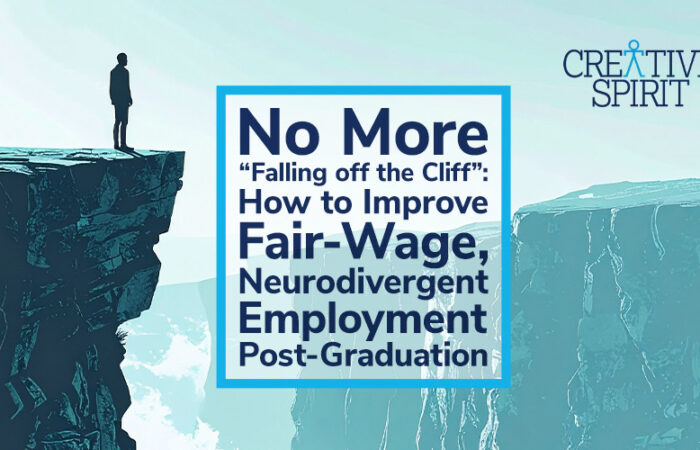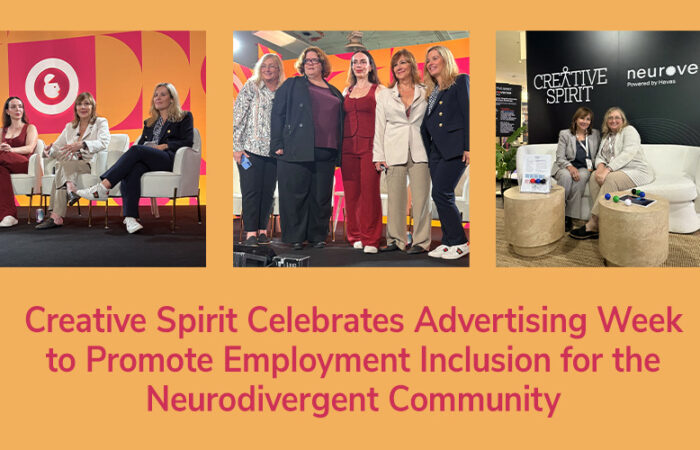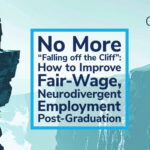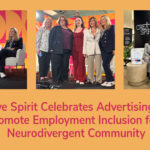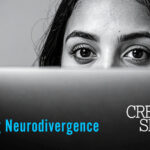By Menachem Rephun, Creative Spirit Communications Manager
In the United States, over 5 million adults and 3.2% of children have autism spectrum disorder (ASD), according to data from the Centers for Disease Control (CDC). ASD is a range of neurodevelopmental conditions that affect social interaction, often involving sensory sensitivities, literal thinking, and repetitive and restrictive behaviors. At a press conference on April 16, U.S. Department of Health and Human Services (HHS) Secretary Robert F. Kennedy Jr. pledged to unearth the root “cause” of autism by September of 2025. The exact cause (or causes) of ASD has eluded researchers and scientists for decades, though they believe genetic and environmental factors play a role. Despite RFK Jr.’s pronouncement, the Trump Administration has slashed funding for autism research, gutting the Department of Education’s Institute of Education Sciences. A report from Time Magazine states that the institute, which has a budget of $800 million, has been a leader in autism research, developing and evaluating school-based interventions to improve outcomes for students with autism. The Trump administration’s layoffs have left the organization with only a skeleton staff and imperiled key projects that were midway through completion.
Kennedy has long been a controversial figure due to his embrace of fringe conspiracy theories, such as the scientifically-debunked linking of autism to vaccines. During his HHS confirmation hearing on January 30, Kennedy refused to state unequivocally that vaccines do not cause autism, pointing to a flawed research paper to suggest that they do. At the April 16 press conference, Kennedy described autism as “an individual tragedy” that “destroys families”, offering the grim prognosis that children with autism “will never pay taxes. They’ll never hold a job. They’ll never play baseball. They’ll never write a poem. They’ll never go out on a date. Many of them will never use a toilet unassisted.” Kennedy’s claim that “most cases [of autism] now are severe” has been challenged by both medical experts and people on the autism spectrum. As PBS.org writes, “The vast majority of people on the spectrum do not have those severe challenges.” Kennedy’s generalization ignores the fact that many people with ASD are gifted with outstanding memories, expert attention to detail, and exceptional skills in science, mathematics, computing, engineering, and many other fields that make them ideal candidates for a wide variety of roles. On top of the above-mentioned comments, Kennedy’s HHS stoked further controversy this month by announcing plans to launch a national autism registry using the private medical records of American citizens (whether they will be able to opt-out remains unclear). The move has sparked backlash from autism advocacy groups due to concerns over invasion of privacy, violations of consent, and undermining the rights of individuals with autism.
“It sounds like it might breach HIPAA,” Brad Zelinger, Founder and CEO of Stride Autism Centers, was quoted as saying by CBS2Iowa.com. Zelinger charged Kennedy’s proposal with “undermining the dignity and rights of individuals with autism. These are people with rights and we can’t just toss that away.”
In a post on X, Democratic NY State Assemblyman Angelo Santabarbara blasted the idea as “dangerous, unethical, and a serious threat to privacy. People with autism deserve dignity and respect – not surveillance by their own government.” In an essay for Austin American-Statesman.com, disability advocate Carly Durham challenged Kennedy’s disclaimer that he was referring only to the most severe cases of autism.
“My daughter is nonspeaking,” Durham writes. “She has Down syndrome and autism. She was adopted from foster care. She also tells stories with her eyes, loves with her whole body and has taught our family more about humanity than any politician ever could.” Durham acknowledges “the exhaustion, the grief, the gutting logistics of daily care” that can come with raising a child with a severe disability, but adds that “none of that justifies a narrative that defines her life by what she won’t do.” Kennedy’s view, she writes, reflects what happens when society “sees disability as something to be feared, hidden or “fixed.” When a person’s worth is measured only by what they produce.”
That’s the narrative they’re fed, one that leads to mass institutionalization of children with disabilities.” The alternative to this outlook, often referred to as the “medical model” of disability, is commonly known as the “social model”, which encourages society to adapt and accommodate the basic needs of people with disabilities, rather than treating them as a problem needing to be “fixed” or “cured”. Regarding Kennedy’s claim that he never sees adults his own age with severe autism, Durham points out that this reflects the dark historical reality that, as recently as the 1970s and ‘80s, children with intellectual and developmental disabilities were institutionalized or kept out of public life. She notes that RFK Jr.’s own aunt, Rosemary Kennedy, was lobotomized at 23 and hidden away for the rest of her life. “These lives didn’t disappear,” Durham writes. “They were erased… when we devalue lives that don’t meet a productivity threshold, history tells us exactly where that leads.” Alison Singer, President of the Autism Science Foundation, echoed that sentiment. Durham adds that children with neurodivergence and their families should be treated “with respect, not fear”. We concur that RFK Jr.’s perspective on ASD and disability in general is backwards, shifting away from society’s recent progress toward destigmatizing disability and viewing neurodivergence in a more positive light.
Ensuring fair-wage employment for millions of Americans with ASD, dyslexia, ADHD, and other neurodivergent conditions can’t be fully achieved unless employers appreciate the benefits of neurodiverse hiring and the many strengths, skills, and talents that those individuals contribute. In short, people who are neurodivergent must be fully included in society and the workforce, not misunderstood or marginalized. RFK Jr.’s viewpoint stigmatizes neurodiverse individuals as tragic charity cases, incapable of leading fulfilling or meaningful lives.
Creative Spirit’s work and mission serve as a direct, decisive rebuttal to that outlook. We have seen first-hand, many times over, the enormous talent and potential of neurodiverse individuals. According to HR Future Magazine, teams with neurodivergent professionals (such as those with ASD) are 30% more productive and boast a 90% retention rate. When confronted by ignorance, prejudice, and disparaging attacks against people with disabilities stemming from the highest levels of government, we’re only motivated to work harder to change the way employers think about the neurodiverse community and neurodiverse hiring. Decades of progress in disability rights, including the passage of the Americans With Disabilities Act and the enforcement of Section 504, were built on pushing back against attitudes like those espoused by RFK Jr.. In 2025, the fight continues and, hopefully, history is on our side.
Sources:
1. https://time.com/7279068/trump-administration-autism-research-cuts/
2. https://www.statesman.com/story/opinion/columns/your-voice/2025/04/28/rfk-jr-robert-kennedy-autism-families-need-respect-support-opinion/83249801007/
3. https://www.hrfuture.net/workplace-culture/strategy/diversity-inclusion/30-more-productive-the-roi-of-a-neurodiverse-workforce/#:~:text=Teams%20with%20neurodivergent%20professionals%20are,a%2090%25%20employee%20retention%20rate.
4. https://cbs2iowa.com/news/local/rfk-jrs-autism-registry-plan-faces-backlash-o ttps://www.discoveryaba.com/statistics/how-many-people-have-autism#:~:text=Over%205.4%20million%20U.S.%20adults,with%20autism%20were%20not%20employed.
6. https://www.npr.org/2025/04/23/nx-s1-5372695/autism-nih-rfk-medical-records
7. https://www.factcheck.org/2025/04/rfk-jr-misleads-on-autism-prevalence-causes/
8. https://www.statnews.com/2025/01/30/rfk-jr-vaccines-autism-confirmation-hearing
/
9. https://www.pbs.org/newshour/politics/fact-checking-robert-f-kennedy-jr-s-statements-on-autism



